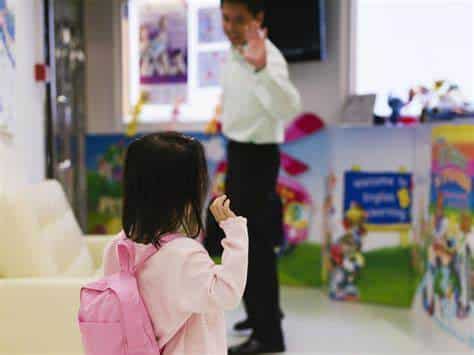Every child will deal with separation anxiety at some point, and it can be a really tough time for both the kids and their parents. While it might seem like there is nothing you can do, there are some strategies you can implement to help your child cope with their separation anxiety.
Just keep in mind that helping a child cope with separation is a gradual and supportive process. Take your time with them and be gentle as you apply the following strategies.
How Can You Help Your Child Cope with Separation?
- Prepare and Provide Information
Talk to your child in advance about the upcoming separation, whether it’s a short-term separation (such as going to school or daycare) or a longer-term separation (such as a parent’s work trip). Explain where you will be and when you will return, using concrete terms they can understand.
- Establish Routines and Consistency
Consistent routines can provide a sense of stability and security for your child. Set up predictable daily routines that your child can rely on, which can help alleviate anxiety and make separations easier to manage.
- Practice Gradual Separations
Gradually introduce short separations to help your child build confidence and trust in your return. Start with brief separations and gradually increase the duration as your child becomes more comfortable.

- Create a Goodbye Ritual
Establish a consistent and positive goodbye routine. This could involve a special hug, a reassuring phrase, or a small item (such as a family photo) that your child can keep with them during the separation. A routine helps provide a sense of predictability and security.
- Encourage Connections with Caregivers
Help your child develop a positive relationship with the caregivers they will spend time with during the separation. Encourage interactions, playdates, and conversations to build familiarity and trust.
- Stay Connected
When possible, maintain regular communication with your child during the separation. This can include phone calls, video chats, or exchanging drawings or letters. Knowing that you are still connected can provide reassurance and help ease any anxiety they may feel.
- Validate Feelings
Acknowledge and validate your child’s emotions about the separation. Let them know that it’s normal to feel sad or worried when apart and reassure them that you understand their feelings. Provide a safe space for them to express their emotions and offer comfort and support.

- Model Resilience
Show your child that you can cope with separations positively. Demonstrate confidence and optimism about your return. Seeing you handle separations in a calm and confident manner can help your child feel more secure.
- Involve Your Child in the Process
Give your child a sense of control and involvement by allowing them to contribute to the separation process. For example, they can help pack a small bag or choose a special item to bring with them.
- Seek Support When Needed
If your child continues to struggle with separation anxiety or if the anxiety becomes severe, consider seeking guidance from a pediatrician, therapist, or child development specialist who can provide further support and guidance.
Remember that each child is unique, and the process of coping with separation may vary. Be patient, understanding, and supportive as your child gradually learns to manage separations more independently.
